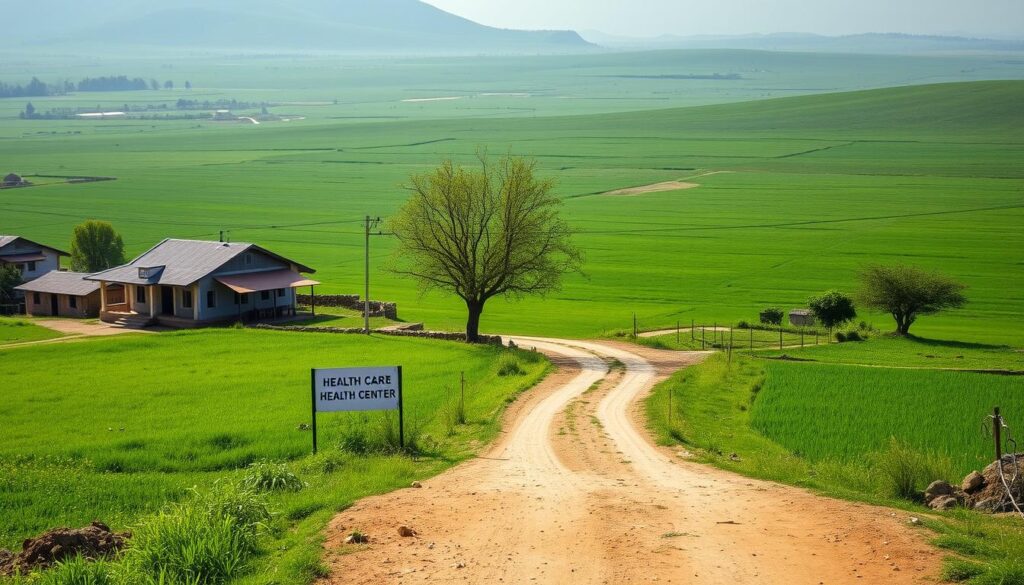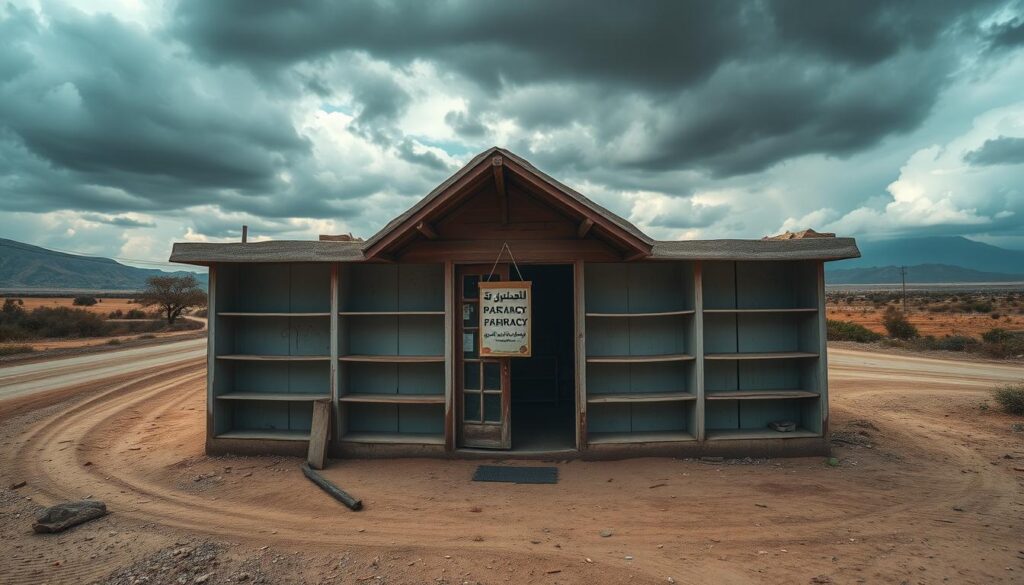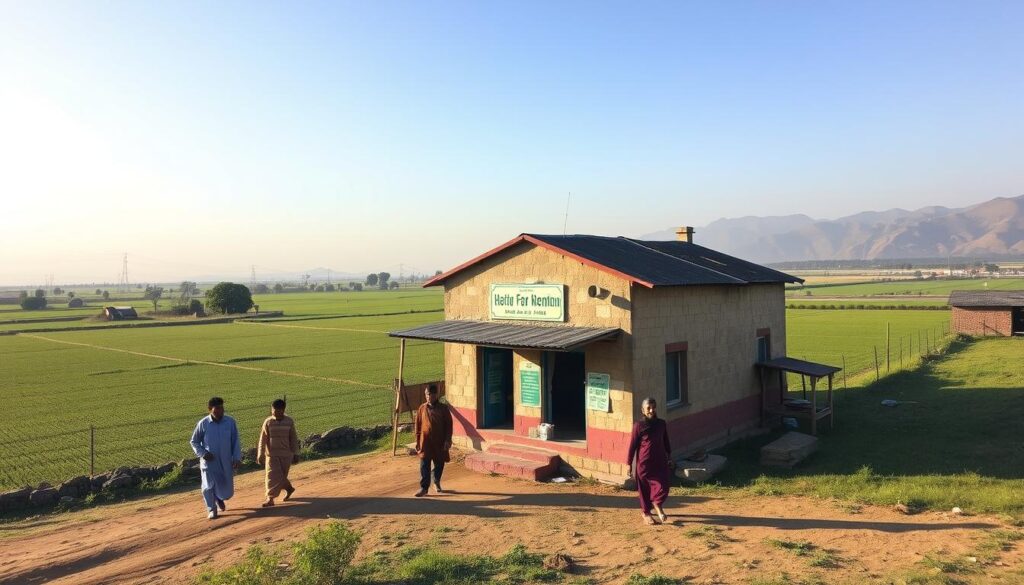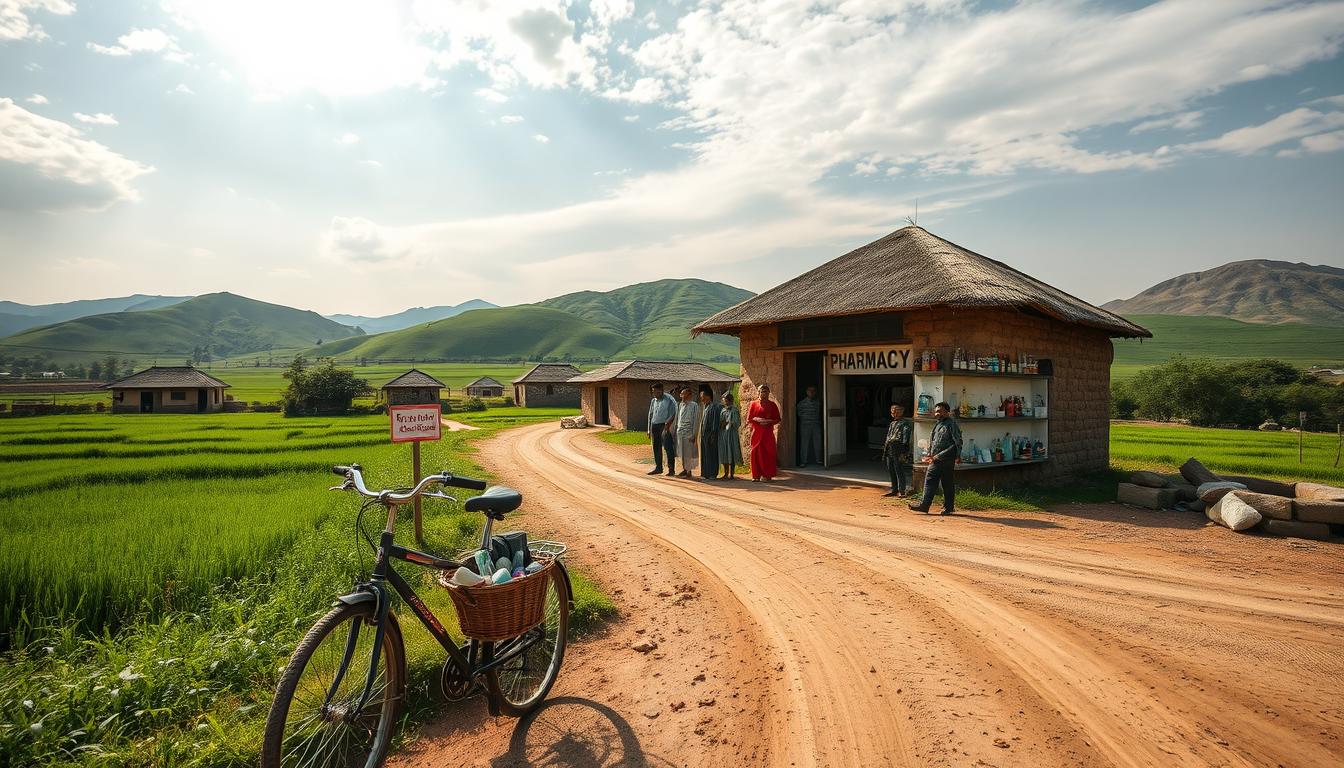In rural Pakistan, a big health problem exists. Many people can’t get the medicines they need. The country is working hard to fix its healthcare, but rural areas are still left behind.
These areas face a lot of health issues because they don’t have easy access to medical help. This problem affects the economy and makes it hard for people to get out of poverty. It also stops these areas from growing and improving.
Key Takeaways
- Rural Pakistan faces a critical public health crisis due to limited access to essential medicines.
- Geographical isolation and lack of healthcare infrastructure exacerbate the challenges of obtaining necessary treatments.
- Poverty and high out-of-pocket healthcare costs further compound the issue, making medicines unaffordable for many.
- Addressing this crisis requires a multi-pronged approach, including innovative solutions and collaborative efforts with international organizations.
- Empowering local communities and stakeholders is crucial for developing sustainable healthcare models in rural Pakistan.
Significance of Healthcare Access in Rural Areas
Rural areas in Pakistan often face a big problem with disease compared to cities. This issue comes from not having enough healthcare, bad sanitation, and poverty. The lack of healthcare in rural areas really hurts the community’s well-being.
Disproportionate Burden of Disease
Rural people in Pakistan get sick more often with diseases like infections, problems with mothers and babies, and chronic conditions. This is because they don’t have easy access to basic care, preventive health, and special treatments in remote places.
Socioeconomic Impact of Poor Health
Poor health in rural areas affects the community’s money and work. It leads to less income and keeps people in a cycle of poverty. Fixing these health issues is key to better health and growth in rural Pakistan.
“Improving access to healthcare in rural areas is not just a public health imperative, but also a key driver of socioeconomic progress and poverty alleviation.”
Healthcare access in rural areas is very important. It helps communities grow and deal with the challenges of rural healthcare infrastructure and regional health inequities.

Rural Pakistan Medicine Access: The Grim Reality
Pakistan aims for universal healthcare, but rural areas face big challenges. Geographical isolation, lack of healthcare, and poor supply chains limit access to essential medicines. This affects those in underserved regions greatly.
Rural communities struggle to get the medicines they need. The terrain and lack of transport make it hard to reach healthcare facilities. Many rural areas also lack basic medical clinics or pharmacies.

The pharmaceutical supply chain in Pakistan often fails. This leads to shortages of essential drugs in remote areas. This issue affects the health and well-being of rural residents. It also makes it harder for them to get the medicines they need.
“The lack of access to essential medicines in rural Pakistan is a pressing public health concern that requires immediate attention and concerted efforts to address the underlying issues.”
Improving healthcare access in rural areas is a big challenge for Pakistan. It needs a strong healthcare system, better supply chains, and fair access to essential medicines. This is crucial for all citizens, no matter where they live.
Barriers to Accessing Essential Medicines
Rural communities in Pakistan face many challenges when trying to get essential medicines. One big problem is how far away these areas are from healthcare. It’s hard for people to get to hospitals and pharmacies.
Geographical Isolation and Transportation Challenges
Many rural villages in Pakistan are hard to get to. They are often in mountains or far from cities. Without good roads or transport, getting to a doctor or pharmacy is tough.
Lack of Healthcare Infrastructure
There aren’t enough hospitals, clinics, or doctors in rural Pakistan. The rural healthcare infrastructure is weak. People have to travel far for basic medical care. This makes it hard to get the medicines they need.
“The geographical barriers and transportation issues faced by rural communities in Pakistan are major obstacles to accessing essential medicines and healthcare services.”
To solve these problems, we need to improve the infrastructure and logistical challenges. This will help make essential medicines more available in rural Pakistan.

Pharmaceutical Supply Chain Bottlenecks
The healthcare crisis in rural Pakistan is worsened by supply chain problems. Poor distribution networks and logistical issues make it hard to get medicines to remote areas. The lack of good transport, storage, and the vast size of the region add to these challenges.
Distribution and Logistics Hurdles
Getting medicines to rural Pakistan is tough due to the rough terrain and poor roads. The supply chain is broken, with gaps between makers, wholesalers, and pharmacies. This leads to late deliveries and shortages. Also, the lack of proper storage and cool places makes medicines less effective.
“The pharmaceutical supply chain in rural Pakistan is a complex web of challenges, from the last-mile distribution to the storage and handling of the drugs. These bottlenecks have a direct impact on the availability and accessibility of essential medications for the people who need them the most.”
To fix these pharmaceutical supply chain challenges and distribution and logistics issues, we need to act. We must find new ways and invest in better infrastructure. This will help rural communities in Pakistan get the healthcare they need.
Affordability and Financial Constraints
Medicines are hard to afford in rural Pakistan, where poverty limits access to healthcare. High costs for medical services and drugs widen the gap between city and country. This makes healthcare less accessible for many.
Poverty and Out-of-Pocket Healthcare Costs
In rural Pakistan, many live in poverty, making healthcare unaffordable. The cost of medicines and treatments quickly drains family funds. Families often skip care or borrow money to pay for it.
“The high out-of-pocket costs associated with healthcare services create a significant financial burden for rural families, preventing them from accessing the medicines they desperately need.”
This financial hurdle hurts rural health and keeps people in poverty. Poor health means less work, less money, and more hardship.
It’s key to make medicines more affordable to improve health in rural areas. New ways to pay for healthcare, government help, and community efforts are needed. Everyone should get the care they need, no matter their wealth.
Role of Government Initiatives
The Pakistani government has taken steps to tackle healthcare issues in rural areas. They focus on the lack of access to essential medicines. With national health programs and policies, they aim to make healthcare fair for everyone.
National Health Programs and Policies
The Sehat Sahulat Program is a key initiative. It’s a universal health insurance that offers free healthcare, including medicines, to poor families. This program helps reduce the financial stress on rural communities and improves their healthcare access.
The government also has the National Essential Medicines List. It makes sure public healthcare facilities have a set of essential medicines. This policy helps rural areas get affordable, quality medicines, solving the problem of medicine shortages.
The National Health Vision 2016-2025 is another important plan. It aims to strengthen the healthcare system. It works on improving healthcare infrastructure, training healthcare workers, and using digital technologies like telemedicine to reach rural areas.
Even with these efforts, more work is needed. The goal is to help the most vulnerable communities. We must work together to fill the gaps in rural healthcare.
Innovative Solutions for Rural Healthcare
The healthcare crisis in rural Pakistan is severe. New solutions are being found to help people get the medicines they need. Telemedicine and mobile health technologies are two promising ways to solve these problems.
Telemedicine and Mobile Health Technologies
Telemedicine lets people talk to doctors from far away. This means patients in rural areas can get advice and prescriptions without traveling far. Mobile health technologies, like apps and wearables, help community health workers track patients’ health. They send updates to doctors in real time.
Community Health Workers and Outreach Programs
Community health workers are also making a big difference. They come from the local areas and help connect people with healthcare. Through outreach programs, they spread awareness, give out medicines, and help people find resources.
These solutions can help improve healthcare in rural Pakistan. They can make it easier for people to get the medicines they need. This can greatly improve the health and well-being of rural communities.
Regional Disparities and Health Inequities
Pakistan is working hard to make healthcare available to everyone. But, there are still big differences in health care between cities and rural areas. Rural areas find it hard to get to the medicines and health services they need.
Many things cause these health differences. These include being far from cities, not having enough health care places, and not having enough money. In rural areas, it’s hard to get to doctors and pharmacies because of lack of roads and cars.
“Addressing the urban-rural healthcare divide is crucial for achieving equitable and sustainable development across Pakistan.”
These health differences lead to more sickness and worse health in rural areas. Not having good health care affects how well people can work and live. This makes it hard for these areas to get out of poverty.
It’s very important for Pakistan to make health care the same in cities and rural areas. New ideas, government plans, and help from other countries are needed. This will help make sure everyone can get the health care and medicines they need, no matter where they live.
Collaborating with International Organizations
The public health crisis in rural Pakistan is ongoing. It’s clear that working together is key to solving the problem of getting essential medicines. By teaming up with international groups, Pakistan can use global knowledge and resources to find new ways to help people.
Groups like the World Health Organization and United Nations International Children’s Emergency Fund (UNICEF) know a lot about improving healthcare, especially in hard-to-reach places. Through these global health partnerships, Pakistan can find funding, share ideas, and use strategies that work elsewhere.
“Collaborative efforts with international organizations can be instrumental in bridging the urban-rural divide and ensuring that even the most remote communities have access to essential medicines and quality healthcare.”
Working with international organizations also opens doors to new technologies. Things like telemedicine and mobile health can change how healthcare is given in rural areas. These partnerships can help overcome the challenges of distance and poor infrastructure.
In the end, the partnership between Pakistan and global health groups can lead to a better healthcare system. It will make sure everyone has access to the medicines they need.
Sustainable Financing Models for Rural Healthcare
Fixing the issue of getting essential medicines in rural Pakistan needs new and lasting funding ways. Experts say we must go beyond old funding methods. We need to find new paths that help the rural healthcare system grow.
One good idea is to use public-private partnerships. These partnerships combine the government’s resources with the private sector’s know-how. They can create new ways to fund essential drugs and medical supplies in far-off places. Telemedicine and mobile health technologies could also help. They can make healthcare more accessible and cut down on the need for old-fashioned clinics.
“Sustainable financing is the backbone of a strong rural healthcare system. We must look beyond usual funding sources. We need new ways that help communities and keep essential services going for the long haul.”
Community-based funding plans, where locals pool their resources, are also key. These plans help rural areas deal with money problems. They make people feel responsible and help the government’s efforts. This way, we get a steady source of money for rural healthcare.
As Pakistan looks to improve rural healthcare financing, it’s important to use many strategies. We need to use technology, partnerships, and community involvement. Only with a wide-ranging, lasting funding plan can we make sure everyone gets the medicines and care they need.
Empowering Local Communities and Stakeholders
Accessing essential medicines in rural Pakistan is a big challenge. Empowering local communities and engaging stakeholders is key. This approach helps develop solutions that meet the needs of these areas.
Community empowerment is central to this strategy. It makes rural residents active in healthcare decisions. Local groups can then speak up, advocate, and work with healthcare and government.
Stakeholders like pharmaceutical companies, logistics providers, and regulatory bodies also play a crucial role. Working together, they can fix supply chain issues. This ensures medicines are affordable and accessible in rural areas.
- Significance of Healthcare Access in Rural Areas
- Rural Pakistan Medicine Access: The Grim Reality
- Barriers to Accessing Essential Medicines
- Pharmaceutical Supply Chain Bottlenecks
- Affordability and Financial Constraints
- Role of Government Initiatives
- Innovative Solutions for Rural Healthcare
- Regional Disparities and Health Inequities
- Collaborating with International Organizations
- Sustainable Financing Models for Rural Healthcare
- Empowering Local Communities and Stakeholders
